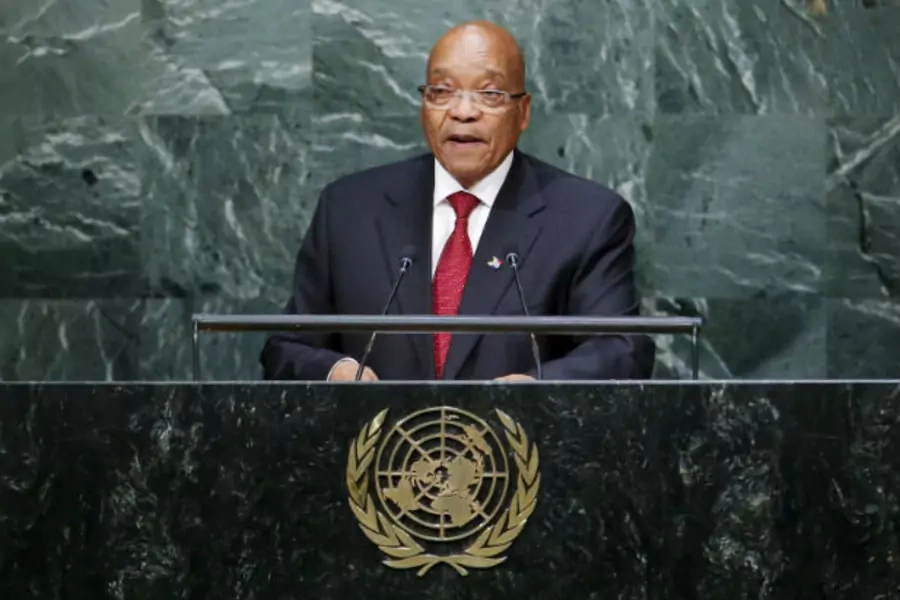So You Want to Be a Global Power: South Africa’s Ambitions on the World Stage

More on:
The following is a guest post by Naomi Egel, research associate in the International Institutions and Global Governance program.
As a member of the BRICS, a leader in African peacekeeping, and an aspiring UN Security Council permanent member, South Africa plays a significant role in global governance and aspires to a greater role. To better understand the factors driving South African foreign policy—including both aspirations and limitations—the International Institutions and Global Governance program held a workshop in Cape Town on March 1, 2016, in conjunction with the South African Institute of International Affairs.
Five takeaways stand out:
1. South Africa is still invested in the BRICS group (composed of Brazil, Russia, India, China, and South Africa) and sees it as a powerful mechanism to advance its national interests.
Although it pursues multilateral foreign policy through a variety of venues, South Africa is arguably more invested in the BRICS grouping than any of the other four members, and sees this as the most promising path to boost its international standing, address transnational challenges, and reform existing global governance structures. Even if the BRICS cannot offer a fully-fledged alternative to the current world order, the group is a powerful symbol of developing countries’ frustration with the status quo. However, South Africa’s focus on challenging the existing international power structure adds additional strain to the U.S.-South African relationship—while often ignoring the two countries’ mutual interests.
2. South Africa’s search for alternatives to the current world order reflects a desire for more equitable global institutions and a counterweight to still-dominant Western powers.
South Africans have long felt excluded from decision-making in international organizations and are seeking to increase the representation and weight of developing countries (led, of course, by South Africa) in such bodies. In this regard, the BRICS are seen as providing a powerful challenge to the Western-dominated world order. Many South Africans are confident that the BRICS’ New Development Bank will demonstrate that rising powers are capable of delivering tangible results by bypassing Western-dominated institutions like the World Bank. When it comes to the UN Security Council, in contrast, South Africa aspires not to replace the institution but to become one of its permanent, veto-wielding members.
3. Domestic challenges remain the primary focus for South Africa’s government, impeding its ability to articulate a coherent foreign policy vision.
South Africa’s significant domestic challenges—including massive inequality, high unemployment, grinding poverty, and corruption—pose serious barriers to the country’s ability to achieve its foreign policy objectives and, more fundamentally, threaten internal social stability. The governing African National Congress (which has held power since the end of apartheid in 1994) is internally divided, and President Zuma has faced repeated calls for his impeachment. On March 31, the Constitutional Court further undermined his legitimacy by ruling that he had violated the constitution in refusing to repay taxpayer money spent renovating his private home. The country’s struggles to live up to its own post-liberation expectations are eroding South Africa’s moral authority to serve as a mediator in African conflicts and to promote alternatives to the Western-led world order.
4. Policy uncertainty, including the constantly changing regulatory environment, discourages private sector growth and investment in South Africa.
South Africa’s efforts to strengthen its economy by attracting foreign direct investment and building domestic investment capacity are undermined by unclear and rapidly changing laws and regulations. The combination of government frustration with private sector noncompliance and private sector uncertainty regarding requirements for complying with government regulations generate significant economic waste and inefficiency. Erratic leadership has contributed to incoherent policymaking—and markets have responded negatively. A glaring episode in this regard was President Zuma’s peremptory decision in December 2015 to sack Nhlanhla Nene, the well-respected finance minister and replace him with the inexperienced but loyal David van Rooyen, only to replace the latter several days later (in the face of public outcry) with the experienced former finance minister Pravin Gordhan—but then offer only lukewarm support for Gordhan.
5. Since the end of apartheid, South Africa has become a stabilizing but inconsistent leader on the continent. It will continue to be a major presence in regional peacekeeping.
Although South Africa is scaling back its involvement in peacekeeping operations from Darfur to the Democratic Republic of the Congo, this is not a full-scale withdrawal. The country remains anxious to be seen as the continent’s natural leader. Moreover, South Africa is aware that leadership in African peacekeeping is a crucial justification in its bid for a permanent UN Security Council seat. At the same time, continental leadership is a central component of South Africa’s power on the global stage.
In sum, South Africa’s ability to achieve its aspirations on the global stage will depend not only on how it navigates relations with existing and other emerging powers, but also on its ability to get its own house in order.
To learn more, read the full report: “South Africa: An Emerging Power in a Changing World”
More on:
 Online Store
Online Store